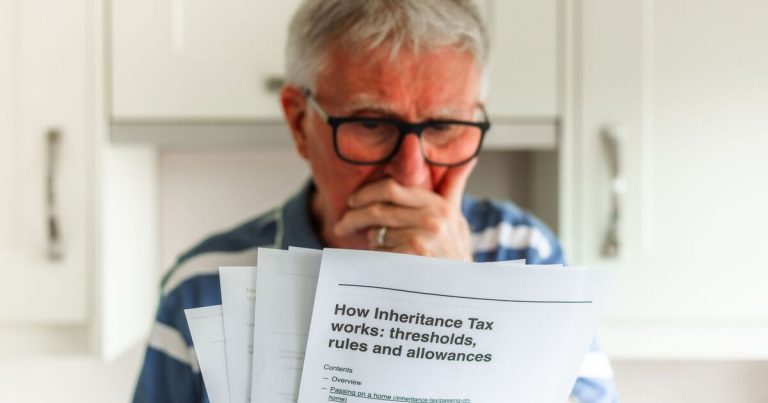
There’s often key financial information that remains unknown to many families across Britain until the death of a loved one, which can cause unrest and sometimes even disputes at an incredibly difficult time.
One of the most confusing and unknown pieces of information is inheritance tax, which is why Express.co.uk has spoken to some experts to clarify some of the common mistakes families make which can lead to ‘significant and unexpected’ inheritance tax bills.
What is inheritance tax?
Inheritance tax is a tax that you’ll have to pay on the property, money, and possessions of someone who has died.
The standard inheritance tax rate is 40 percent, but this is a tax that is only charged if someone’s estate is worth more than £325,000.
In the UK, if someone passes away, beneficiaries can take £325,000 of the estate tax free.
For example, if an estate is worth £400,000, £325,000 of the estate will go away to your beneficiaries’ tax free. On the remaining money, which is £75,000, beneficiaries will pay a 40 percent tax of this sum, which is £30,000, leaving them with £35,000 to keep.
What are common inheritance tax mistakes families make?
Rafael Singer, a specialist in wills, trusts and estate planning at Hodge Jones & Allen, gave an example of a common scenario where inheritance tax plays a bigger part than families across the UK may have originally thought.
This is where the deceased is married with children who are minors.
Mr Singer explained: “Usually in this scenario, the deceased’s will would state that their estate passes first to their spouse. However, if their spouse pre-deceases them, then their estates pass on to their children. Usually after this first death in the marriage, the surviving spouse may then want to take inheritance tax advice, as inheritance tax would only be an issue on the second death in the marriage.
“They make such a will to take advantage of inheritance tax spousal exemption. There is no inheritance tax liability if the estate is passing to the spouse in its entirety.
“If no will is made, then the intestacy provisions are as follows:
– All possessions pass to the surviving spouse.
– The first £270,000 of the estate, called ‘the statutory legacy,’ passes to the surviving spouse.
– What is left of the remaining estate, after liabilities are paid, is divided in two:
- The first share passes to the surviving spouse
- The second share passes to the children in equal shares. In this scenario, the children are under 18 and so their shares are held on trust, with the spouse being the sole trustee.”
Another common mistake families in Britain make according to Mr Singer is that they don’t take into account the fact that, unlike spouses, children are not exempt from inheritance tax.
Therefore, in this scenario, there could be a significant and unexpected inheritance tax liability on this death arising from the forced gift to the children.
Although estates can be varied within two years of death (so that everything could instead pass to the spouse to avoid any inheritance tax), the variation must be approved by the beneficiaries who would stand to lose under the variation.
In this scenario, the beneficiaries who would stand to lose would be the minor children and they would not be old enough to consent to the variation. An application could be made to the court to vary the will.
However, the court is unlikely to stop a gift passing to children, purely for the sake of avoiding inheritance tax.







